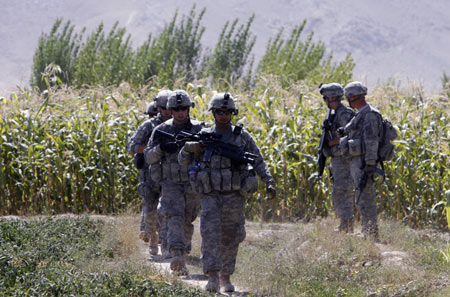Afghan peace needs a map
Afghanistan's political and social turmoil has been aggravated by different intentions of the participating nations that constitute the coalition forces.
 |
|
The U.S. Soldiers search for IEDs (improvised explosive device) laid by the Taliban near the village of Eber in Logar province September 26, 2009. [Xinhua/Reuters Photo] |
In the short term, the fragile Afghan regime is finding it difficult to tame its restive domestic situation. Still, a prescription could help bring the country out of the mess if key players adopt a peaceful and reconciliatory approach in their push for the end of the war.
The United States should first put an end to the war. The anti-terror war, which the former US administration of George W Bush launched in 2001, has turned out to be the source of ceaseless turbulence and violence in the past years.
To promote much-needed reconciliation among the parties concerned, the US should end its military action. The war has neither brought the Islamic nation peace and security as the Bush administration originally promised, nor brought any tangible benefits to the US itself. On the contrary, the legitimacy of the US military action has been under increasing doubt.
Public opinion within the US on the war has undergone dramatic change. According to a recent poll, opinion in favor of the war has declined from 53 percent in April to 39 percent, while opinion opposed to the war has increased to 58 percent from 46 percent. The US Congress has also cast doubt over the Obama administration's Afghanistan strategy. The opposition from 74 percent Democrats and 70 percent independent votes to the war would be a big restraint on the Obama administration's larger military strides given that the new president cannot afford to bet his political fate on a unpopular war.
Since taking office as president, Obama has been under pressure from the Pentagon for military reinforcements in Afghanistan. The calls of war opponents over that of supporters will give the young US president the best chance to extricate himself from the Pentagon's pressures. If Obama resolutely decides to stop the war, that would not only meet the US public expectations and save more American lives, but also help recover the US' peaceful image and enhance the president's personal political prospects.
Another way to help Afghanistan break the current deadlock is to promote reconciliation among the Afghan government, the Taliban and the country's major warlords, all being key actors that can play an influential role in deciding the country's prospect. In addition to the US factor, the chaos in Afghanistan is also closely related to the long-standing domestic strife between factions. Afghanistan experienced numerous wars and conflicts in history, including invasion by the Soviet Union in the late 1980s and the US war. The war-ravaged Asian nation is undergoing a chaotic battle that has involved the US-led coalition forces, its government troops and domestic warlords, the Taliban and Al Qaeda forces. The disorderly confrontations and strife do no good to anyone but have only caused untold suffering to Afghan people.
Afghanistan's political disorder is also the main cause of its domestic chaos. The country's presidential election on Aug 20 has so far failed to produce a final result.
The recount of votes in more than 600 polling stations alleged to have suffered fraud is expected to last another two or three months, which will add to the chaos. The US has urged Afghan president Hamid Karzai to hold a second round of voting. It seems that Karzai has hammered home the perception that the US is not a reliable partner that can help end Afghanistan's current predicament. Talks, he thinks, is the only way out. The Afghan president is likely to open the process of tri-party peace talks with the Taliban and major warlords provided that the US ends its military action.
Support from the international community is needed to help Afghanistan make a substantive move toward peace. The international community can take advantage of the ever-mounting anti-war calls within the US to prompt the Obama administration to end the war and withdraw US troops. Germany, France and Britain have planned an international conference this year to discuss the gradual withdrawal of Afghanistan military deployment. International pressures may offer Obama another excuse to withdraw US troops. The UN Security Council should carry the baton from the three European nations to convene a conference on the Afghanistan issue and try to reach a consensus among its five permanent Security Council members and draft a roadmap and timetable for resolution of the thorny issue. In the process, a ticklish issue is whether parties concerned can accept the Taliban as a key player in Afghanistan and how to dispose of the Al Qaeda armed forces, an issue that has a key bearing on the outcome of any international conference on the Afghanistan issue.
Surely, an international peacekeeping mission is needed in the absence of US troops. With the aid of international peacekeepers, the Afghanistan government and its security forces can be expected to exercise effective control over domestic unrest and maintain peace and security.
 0
0 






